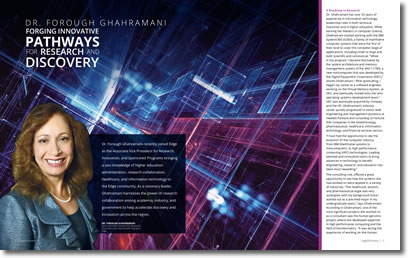A Roadmap to Research
Dr. Ghahramani has over 25 years of experience in information technology leadership roles in both technical industries and in higher education. While earning her Masters in computer science, Ghahramani started working with the IBM System/360 (S/360), a family of mainframe computer systems that were the first of their kind to cover the complete range of applications, including small to large and both scientific and commercial. “While in my program, I became fascinated by the system architecture and memory management system of the VAX-11/780, a new minicomputer that was developed by the Digital Equipment Corporation (DEC),” shares Ghahramani. “After graduating, I began my career as a software engineer, working on the Virtual Memory System, at DEC, and eventually moved onto the Unix operating systems development team.” DEC was eventually acquired by Compaq and the HP. Ghahramani’s industry career quickly progressed to senior level engineering and management positions at Hewlett Packard and consulting to Fortune 500 companies in the biotechnology, pharmaceutical, healthcare, information technology, and financial services sectors.
“I have had the opportunity to see the evolution of the computer industry from IBM Mainframe systems to minicomputers, to high performance computing (HPC) technologies. Leading talented and innovative teams to bring advances in technology to benefit engineering, research, and education has been most rewarding.”
The consulting role, offered a great opportunity to see how the systems she had worked on were applied in a variety of industries. “The healthcare, biotech, and pharmaceutical angle was very synergistic with my background since I started out as a pre-med major in my undergraduate years,” says Ghahramani. According to Ghahramani, one of the most significant projects she worked on as a consultant was the human genome project, where she developed expertise in high performance computing and the field of bioinformatics. “It was during the experience of working on the Human Genome project when I realized the important role of advanced computing technologies on accelerating research, and recognized the impact of providing platforms for great minds to be genuinely creative!”
Dr. Ghahramani’s experience in higher education began when developing curricula for biomedical informatics and health information technology programs for a DeVry University. In addition to curriculum development, she went on to teach computer science, bioinformatics, and project management courses. She later became a department chair, followed by associate dean positions in several of the colleges and the Keller Graduate School of Management. “One of my most exciting projects in higher education leadership, was developing the neurodiagnostic technology program, in partnership with the New Jersey Neuroscience Institute.”
The unique program partnered academia and healthcare and was the only program of its kind offered in the region,” explains Ghahramani. With a desire to learn more about higher education leadership, and understand the formal methodologies of research, she returned to school to get her doctorate in Higher Education Management, with a research focus on Innovation Ecosystems and the role of institutions in promoting inclusive pathways for woman innovators in science, technology, engineering, and math (STEM) disciplines. “Throughout my career, I have spent most of my volunteer activities trying to help shape initiatives that provide opportunities for girls and women in STEM.” Ghahramani continues to be an active advocate for STEM education by promoting greater diversity and inclusion in these areas of study.
Upon earning her doctorate and prior to joining Edge, Dr. Ghahramani was Associate Director of the Rutgers Discovery Informatics Institute (RDI2) at Rutgers University, where she led the administration of the institute, developed educational programs focused on big data and large scale computing, was responsible for vision and strategic planning for outreach and enhancing research productivity for the institute through industry and academic partnerships, and cross-disciplinary collaborations. Dr. Ghahramani represented RDI2 on many fronts, including in regional and national organizations.
Ghahramani’s passion for research continues through her research activities. She has served as the Education Lead for the Virtual Data Collaboratory (VDC), a multi-institutional, multi-disciplinary collaboration project. The VDC is a federated data cyberinfrastructure that is designed to drive data-intensive, interdisciplinary and collaborative research, and enable data-driven science and engineering discoveries. In addition, Ghahramni’s research related to women in STEM innovators and inclusive innovation ecosystems has resulted in several publications, including contributions to a chapter in the book, GENDER, SCIENCE AND INNOVATION released January 2020.
“The insight gained from my diverse experience in higher education and working with the research community, coupled with my background in the information technology industry, will be invaluable in my current role at Edge as Associate Vice President for Research, Innovation, and Sponsored Programs.”
The Future of Collaborative Research
Edge is a premier regional provider of research and education networking and is deeply involved with the research agenda in New Jersey and beyond. With a focus on creating a platform for peers to network and connect, Edge is committed to helping drive innovation forward by enabling research to take place at a high level. “Collaboration is at the heart of research,” says Ghahramani. “I believe Edge can help establish a research ecosystem that can accommodate multi-institutional and multi-researcher collaborations.”
Ghahramani’s colleague at Rutgers, Dr. Barr von Oehsen, Associate Vice President of the Office of Advanced Research Computing (OARC), also recognizes the importance and impact of research collaboration. “I’ve had the pleasure of working with Dr. Forough Ghahramani for several years while she was at Rutgers University and I’m excited about working with her in this new role,” shares von Oehsen. “Through the support of both Rutgers and Edge, Dr. Ghahramani and I have an opportunity to better support research and education across the state of New Jersey as we develop platforms designed to break down the barriers often encountered through multi-campus collaborations and partnerships and to offer access to local, regional, and national resources and data.”
Ghahramani adds that Edge plays an important role in facilitating research by providing access to essential technology and through their involvement with a large range of institutions, from K-12 to the higher education community, including R1 institutions. “The ultimate outcome of research collaboration is innovation and I see Edge playing a vital role in forging innovative pathways.”
Edge continues to expand their role in promoting research collaboration and delivering technology solutions. Strategic partnerships, like those with the Eastern Regional Network (ERN), Internet2, the Quilt and the New Jersey Big Data Alliance (NJBDA), introduce important opportunities to Edge members. “Through these partnerships, we can expand the tools available to the research community, as well as raise awareness about the initiatives and projects underway,” says Ghahramani. “The next generation of inventors is here, across all levels of education, and Edge aims to showcase the research and innovation that is happening in New Jersey.”
Expanding Connectivity within the Community
Edge works with research institutions to expand connectivity to facilitate research collaboration, grant proposal development, recruitment, publication, and communication of the research activities within the state. By doing so, Edge hopes to increase the state’s research funding from national agencies and programs, improve recruitment and retention of top students and researchers, and improve the profile and support for research in the region, In addition, Edge strives to increase the quality and connectedness of the New Jersey research community and encourage better allocation of research resources.
To expand connectivity, Edge will continue to host statewide networking forums for New Jersey researchers. “These forums will focus on interdisciplinary research areas, where investigators from the state and the region showcase their current research in various fields ranging from biomedical and life sciences to energy and the environment, to AI and Quantum Computing,” shares Ghahramani. “The desired result is an increased number of multi-institutional research collaborations established and funded.” Ghahramani says Edge plans to organize more research working groups to guide research collaboration in various disciplines and industries including life science, energy, and environmental science. “The working groups will invite representatives from the state and the region’s research institutions, as well as colleagues working in relevant New Jersey industries to make recommendations that leverage existing research strengths and equipment, and position the state and region to be as competitive as possible for funding opportunities, human resources recruitment, and industry contracts.”
Dr. Forough Ghahramani recently joined Edge as the Associate Vice President for Research, Innovation, and Sponsored Programs bringing a vast knowledge of higher education administration, research collaboration, healthcare, and information technology to the Edge community. As a visionary leader, Ghahramani harnesses the power of research collaboration among academia, industry, and government to help accelerate discovery and innovation across the region.
Dr. Forough Ghahramani
Associate Vice President for Research, Innovation, and Sponsored Programs, Edge
The Evolving Nature of Research
New models for research are emerging — driven by new technology capabilities, high performance networking and computing, and the availability of structured and unstructured data and analytics. “The role of research computing and data in scientific discovery and scholarship across all disciplines presents challenges, as well as opportunities,” says Ghahramani. “The challenges are not only for the service providers, but also for the researchers who are trying to keep pace. We must be able to identify the existing roadblocks and understand the research impediments to further facilitate collaboration opportunities. In addition, investing in cross-disciplinary application of data science, artificial intelligence, and quantum computing will create new opportunities for innovation.”
The role of Edge is uniquely positioned to partner with colleges and universities to understand their challenges and create a portfolio of technology solutions, while amplifying the strength of all members. “Edge helps spearhead academic and research collaborations by facilitating remote use of unique resources including advanced research computing centers, libraries, and datasets,” says Ghahramani. “We will continue to identify and support new collaborative projects in the research and education community, while providing the data-driven high performance networking infrastructure and access to dynamic network services that enable rapid movement of diverse scientific datasets.”
Expanding Undergraduate Research
Based on strong partner relationships, Edge provides easy access to a variety of industries, government partners, and universities to identify emerging issues and opportunities for coordinated research projects. “Universities are redefining how they work with industry partners to conduct research and train students,” says Ghahramani. “Our students are key to closing the widening skill gap that has emerged. Edge can help member institutions initiate an undergraduate research program by sharing best practices among institutions, providing the necessary technology and testbeds, and facilitating industry-academic collaborations resulting in enhanced higher education curriculum that is responsive to, and aligned with, the skill sets required in industry.
The list of Research Universities in the Carnegie Classification of Institutions of Higher Education continues to grow in the state of New Jersey. Edge assists member institutions in the advancement of Carnegie classifications by seamlessly connecting research collaborators and resources. “Edge facilitates shared access to low latency and high bandwidth networks, data repositories, advanced computing resources, and specialized research instruments,” states Ghahramani. “We eliminate the roadblocks and help accelerate the development of multi-institutional, multi-investigator research projects ranging from those at small, private colleges to large research institutions.”
The Opportunities Ahead
By building bridges across research and IT silos, the boundaries of research vastly expand, allowing new test beds and emerging technology to evolve. “Alliances between science drivers, like medical and clinical research, genomics, climate research, computational social sciences, and systems biology, allow for a surge of new opportunities,” says Ghahramani. “Edge supports these partnerships by creating intelligent networks that provide access to research, resources, and technology for the entire educational research community —no matter the size of the institution.” Through these connections, institutions are offering insight into methods of storing, processing, and moving data through a shared infrastructure. Edge continues to develop new ways to provide a research and education platform that can support a diverse set of science drivers and educational opportunities.
“The research landscape is changing very quickly,” says Ghahramani. “This change is driven by new technology and the need to deliver more rapid, reliable, and sustainable results. I look forward to being a part of the transformative impact on the region’s research communities in both small and large institutions and enabling multi-campus partnerships that advance the frontiers of research and innovation, with ultimate impact on advancements in science, technology, medicine, society, and economic growth.”
“Collaboration is at the heart of research. I believe Edge can help establish a research ecosystem that can accommodate multi-institutional and multi-researcher collaborations.”
Dr. Forough Ghahramani
Associate Vice President for Research, Innovation, and Sponsored Programs, Edge




